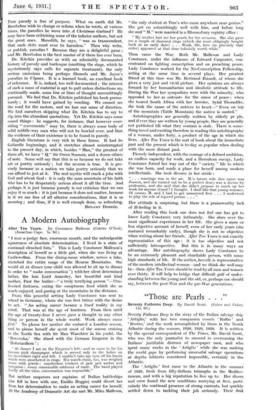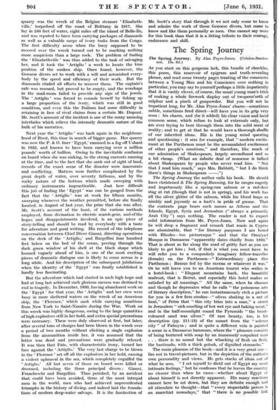"Those are Pearls . . ."
Seventy Fathoms Deep is the story of the Italian salvage ship Artiglio,' with her two companion vessels Raffio ' and Rostro,' and the work accomplished by them in the North Atlantic during the seasons, 1928, 1929, 1930. It is written by the special correspondent of The Times, Mr. David Scott, who was the only journalist to succeed in overcoming the Italians' justifiable distrust of newspaper men, and who spent many weeks in the Artiglio ' while she was making the world gape by performing successful salvage operations at depths hitherto considered impossible, certainly in the Atlantic.
The Artiglio ' first came to the Atlantic in the summer of 1928, fresh from fifty-fathom triumphs in the Mediter- ranean, and with a big reputation to live up to. Her divers and crew found the new conditions worrying at first, parti- cularly the continual presence of strong currents, but quickly settled down to tackling their job seriously. Their first
quarry was the wreck of the Belgian steamer ' Elizabeth- vine,' torpedoed off the coast of Brittany in 1917. She lay in 240 feet of water, eight miles off the island of Belle-Ile, and was reputed to have been carrying packages of diamonds as well as a valuable cargo of ivory tusks from the Congo. The first difficulty arose when the buoy supposed to be moored over the wreck turned out to be marking nothing more auspicious than a large rock. The problem of finding the Elizabethville ' was thus added to the task of salvaging her, and it took the Artiglio ' a week to locate the true position of the sunken ship. Once found, however, the Genoese divers set to work with a will and astonished every- body by the speed and efficiency of their work. But the diamonds eluded all efforts to recover them. The captain's safe was rescued, but proved to be empty, and the wreckage in the mail-room failed to provide any sign of the jewels. The Artiglio ' was forced to console herself by fishing up a large proportion of the ivory, which was still in good condition, and even this the Italians had some difficulty in retaining in face of rival claims from a certain Mr. Dupont. Mr. Scott's account of the incident is one of the many amusing interludes which relieve the intensely dramatic nature of the bulk of his narrative.
Next year the Artiglio ' was back again in the neighbour- hood of Brest, this time in search of bigger game. Her quarry was now the P. & 0. liner Egypt,' rammed in a fog off Ushant in 1922, and known to have been carrying over a million pounds' worth of bullion. Owing to the inevitable confusion on board when she was sinking, to the strong currents running at the time, and to the fact that she sank out of sight of land, records of the exact scene of the disaster were inaccurate and conflicting. Matters were further complicated by the great depth of water, over seventy fathoms, and by the rocky nature of the bottom which made sweeping with ordinary instruments impracticable. Just how difficult this job of finding the ' Egypt ' was can be gauged from the fact that the Artiglio ' was at work for fifteen months, sweeping whenever the weather permitted, before she finally located, in August of last year, the prize that she was after. Mr. Scott's account of the hunt, of the various methods employed, from divination to electric search-gear, and of the hopes and disappointments involved, is an epic piece of story-telling and should be read by everybody with a taste for adventure and good writing. His record of the telephone conversation between Chief Diver Gianni, directing operations on the deck of the Artiglio,' and Bargellini four hundred feet below on the bed of the ocean, peering through the dark green window of his shell at the black shape which loomed vaguely ahead of him, is one of the most exciting pieces of dramatic dialogue one is likely to come across in a long while. And his description of the subsequent jubilations when the identity of the ' Egypt ' was finally established is hardly less fascinating.
But the adventure which had started in such high hope and had at long last achieved such glorious success was destined to end in tragedy. In December, 1930, having abandoned work on the ' Egypt' for that year, the Artiglio ' and her crew were busy in more sheltered waters on the wreck of an American ship, the ' Florence,' which sank while carrying munitions from New York to .Saint-Nazaire during the War. Work on this wreck was highly dangerous, owing to the large quantities of high explosives still in her hold, and extra special precautions were necessary. These were duly observed at first, but later; after several tons of charges had been blown in the wreck over a period of two months without eliciting a single explosion from the ammunition inside her, it was assumed that the latter was dead and precautions were gradually relaxed. It was then that Fate, with characteristic irony, turned her face against the Artiglio.' The very last charge to be blown in the ' Florence ' set off all the explosives in her hold, causing a violent upheaval in the sea, which completely engulfed the Artiglio.' All but seven of those on board were killed or drowned, including the three principal divers : Gianni, Francheschi and Bargellini. Thus perished, by an accident that could have been avoided, three of the most intrepid men in the world, men who had achieved unprecedented triumphs in the history of diving, and indeed laid the founda, tions of modern deep-water salvage. It is the fascination of Mr. Scott's story that through it we not only come to know and admire the work of those Genoese divers, but come to know and like them personally as men. One cannot say more for this book than that it is a fitting tribute to their courage, endurance and skill.







































 Previous page
Previous page